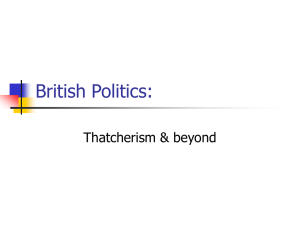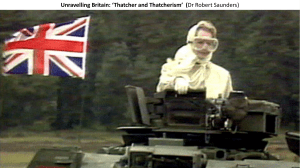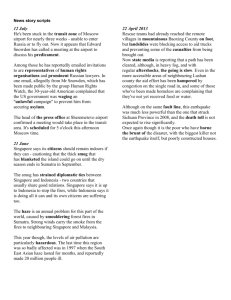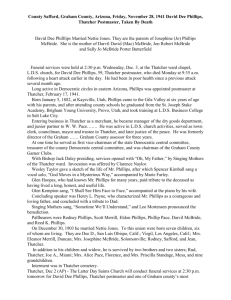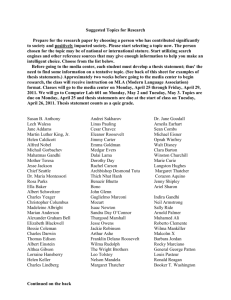Heather Nunn - Cardiff University
advertisement
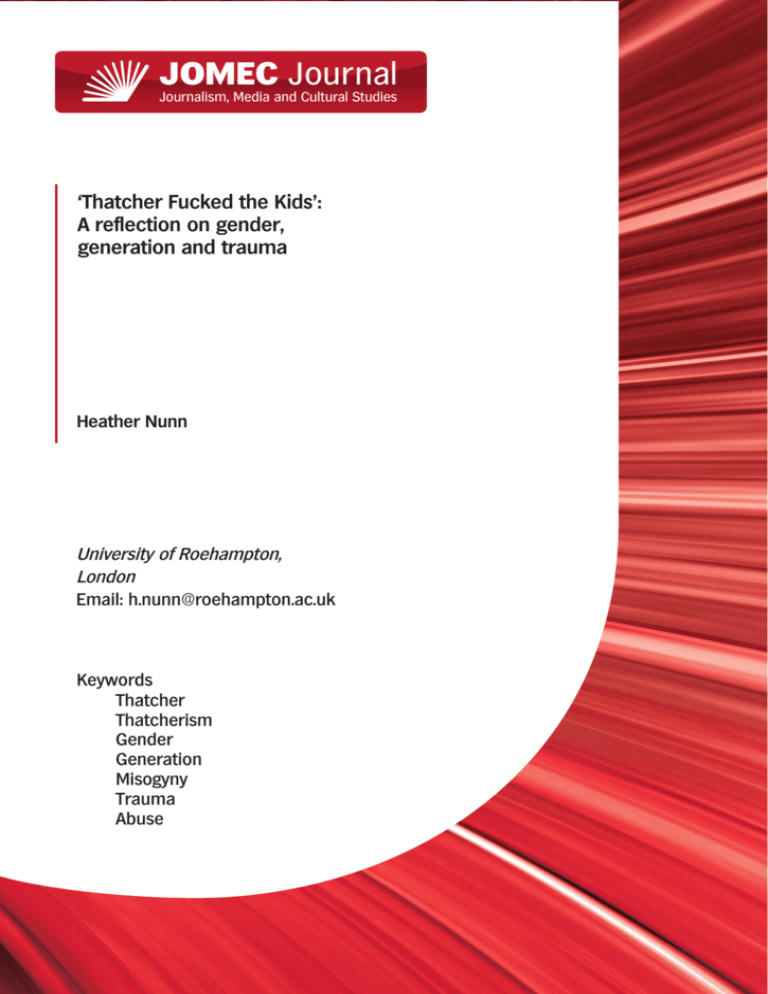
JOMEC Journal Journalism, Media and Cultural Studies ‘Thatcher Fucked the Kids’: A reflection on gender, generation and trauma Heather Nunn University of Roehampton, London Email: h.nunn@roehampton.ac.uk Keywords Thatcher Thatcherism Gender Generation Misogyny Trauma Abuse Abstract This essay is a reflection on Thatcher and Thatcherism and the ways in which both the persona and the political ideology have been linked into accusations of crossgenerational social damage through an articulation of gender, trauma and childhood. In short, it considers how ongoing political and social damage becomes rendered as psychic and sexualised abuse and the problems inherent in this transposition. In doing so this essay aims to offer a pointer for future debate and analysis; signalling how political culture and social damage can be critiqued, assertively and even with the language of invective, but without the unhelpful demonising and sexualisation of the political persona. This essay makes the case that the current difficult experiences of living through an economic period of neoliberal failure and the ensuing exigencies of austerity require us to deploy something more considered than the easy jibe or joke and the deflection of blame to the recently deceased Prime Minister. Overall the essay argues that while Thatcherism should be critiqued and so should Thatcher herself for her part in the launch of the neoliberal project we should also bear in mind that over the long haul the neoliberal project is one in which we have all played our particular parts. If we are to move on we should perhaps consider not only our resistance to neoliberalism but also our complicity. Contributor Note Heather Nunn is Professor of Culture and Politics at the University of Roehampton, UK, where she is a Director of the Centre for Research in Audio-visual Cultures. Her research interests include political communication, formations of class and of gender, and representations of the child, childhood and young adulthood. She has written widely on class, gender and politics. She is the author of Thatcher, Politics and Fantasy (2002). Her co-authored publications with Anita Biressi include Reality TV: Realism and Revelation (2005), The Tabloid Culture Reader (2008) and most recently Class and Contemporary British Culture (2013). She is currently writing a new book with Anita Biressi called Politics Interrupted. cf.ac.uk/jomec/jomecjournal/3-june2013/Nunn_Thatcher.pdf Mrs. Thatcher arrives at Hell and is greeted by Jimmy Savile who says to her ‘Now then, you’re here for screwing minors too?’1 Margaret Thatcher died on 8th April 2013. She was the first female British Prime Minister and will probably be the only female PM in Britain for the foreseeable future. A strangely unsettling story appeared in the Daily Mail newspaper several months before Thatcher’s demise (Ellicott 28th Dec 2012). The headline declared: ‘Censored, Savile's private letters to Mrs. Thatcher: Files edited two months ago … AFTER child abuse claims surfaced’. The article was supported by photographs of Thatcher and Jimmy Savile together, brandishing a cheque donation and campaigning for the children’s charity the NSPCC. Also included was a scanned copy of a handwritten ‘gushing’ letter from Savile to Thatcher written subsequent to a lunch with her in early 1980. Taken together these artifacts and facts aimed to weave a slightly dubious and somewhat prurient conspiratorial connection between the former Prime Minister and the then deceased Jimmy Savile, a former DJ and high profile popular entertainer who had lately and posthumously been denounced as a serial child molester. What to make of this chain of associations, if anything, forms the matter in hand. This essay is a reflection on Thatcher and Thatcherism and the ways in which the persona and the political ideology have been linked into cross-generational social damage through an articulation of gender, trauma and childhood. In short, it considers how ongoing political and social damage becomes rendered as psychic and sexualised abuse and the problems 1 See http://sabotagetimes.com/funny/25-ofthe-best-margaret-thatcher-jokes/ inherent in this transposition. In doing so this essay aims to offer a pointer for future debate and analysis; signalling how political culture and social damage can be critiqued, assertively and even with the language of invective, but without the unhelpful demonising and sexualisation of the political persona. The essay makes the case that the current difficult experiences of living through an economic period of neoliberal failure and the ensuing exigencies of austerity require us to deploy something more considered than the easy jibe or joke and the deflection of blame to the recently deceased Prime Minister.2 Overall the essay argues that while Thatcherism should be robustly critiqued and so should Thatcher herself for her part in the launch of the neoliberal project we should also bear in mind that over the long haul the neoliberal project is one in which we have all played our particular parts. If we are to move on we should perhaps consider not only our resistance to neoliberalism but also our complicity (Biressi and Nunn 2013: 1-22). Thatcher’s election to the highest office represented a powerful shift in the sometimes iconic status of political leaders in Britain. It also represented a flawed and dreadful disappointment for those women (and also some men) who had hoped that she would signify and even trigger a positive shift in parliamentary power for women. At the very least it was hoped that she would take women of all parties with her via a different representational inflection of political power. Despite this disappointment and many subsequent 2 This more nuanced critique is happening in alternative groups. One example is the story unfolding in After Neoliberalism? The Kilburn Manifesto, see http://www.lwbooks.co.uk/journals/soundings/m anifesto.html 1 www.cf.ac.uk/JOMECjournal @JOMECjournal disappointments there is still a case to be made for liberal feminist models of citizenship and politics which demand new rights for women and their inclusion in the spaces and corridors of institutional power. There is also much still to say about the possibilities of an alternative to this conception of historical and current political models of power as ‘masculine’.3 Sometimes this alternative is accompanied by a call for a feminist ‘ethics of care’ which can be coopted to oppose masculine/liberal ‘ethics of justice’. But while these arguments are rigorously made in think tanks, campaigning organisations and feminist scholarship, they are very far from the being dominant in contemporary media discourses about gender, politics and the public realm. For running alongside these historical and ongoing rather marginalised arguments about the paucity of women in power, their mistreatment in the media and their potential to change political practice is a far louder directive and a frequent call for, and celebration of, the specificity of women as women, mothers, carers; that is, as social actors whose contribution to the political field is best enacted in the private domain.4 This set of representations is dominant in both political and consumerist forms as women are prompted to return to the home, become prime targets for redundancy, part-time work or downsizing initiatives and who also arguably bear the ongoing burden of the maintenance of the ‘good life’ in the face of austerity measures. The ‘housewife 3 See for example, http://www.fawcettsociety.org.uk/activity/women -and-power/) 4 For a related debate within the context of postfeminism see Diane Negra’s What a Girl Wants?: Fantasizing the Reclamation of Self in Postfeminism (2009). citizen’ has returned as an exemplar for our times (Giles 2004: 132; Biressi and Nunn 2013: 184-87). This return to woman as mother-citizen, careful consumer and unpaid home-worker is one powerful (often deeply conservative) prop to the argument for a new intimate morality set against the political realm of abstract disconnected mainstream politics which now pervades much public sensibility. It is this form of idealised but sometimes troubled middle-class feminine life that is endorsed so often in the Daily Mail and in lifestyle reportage more generally. Some of the historical roots of this model of privatised political citizenship actually originate from the 1980s (and before that in the post WW2 austerity years), which contradictorily deployed both the superwoman and the homemaker as icons of aspiration; with the latter situating the mother at the centre of a treasured family life. The Thatcherite argument was made that desiring more, wanting more for your family and striving to make that happen, was in effect a ‘caring’ desire and for most women this ethos could be affected inside the home. Despite her own developing public image as an ‘iron lady’ and as a superwoman it was this portrait of maternal authority which Thatcher deployed for herself (especially in the early years) and praised in other women and which she promoted for other women as the obvious life choice. But now, in the Mail, there appears, albeit fleetingly, a quite different image of a powerful female Prime Minister, a member of the institutional elite, who is somehow complicit with the abuse of children. The Mail article contends that Thatcher had a warm relationship with Savile and their released correspondence reveals his fond or even over-keen affection for the Prime Minister. Savile’s 2 www.cf.ac.uk/JOMECjournal @JOMECjournal reprinted letter to Thatcher becomes a prompt for reflections on his close connections to ‘the establishment’ which, it has been argued, somehow shielded him from the scrutiny of the law and allowed his predatory actions to continue unchecked over decades. After all Thatcher invited Savile to numerous New Year’s Eve celebrations at Chequers and she oversaw his knighthood, awarded in recognition of his charity work. The article is, I think, ill-conceived but points to some unspoken and poorly articulated undercurrent of accusation against both the abuse of power in the body politic and also the abuse of power upon the disenfranchised bodies of children. During Thatcher’s premiership, the ‘child at risk’ was attached to a range of social and political concerns including education, family breakdown and media effects. The phrase was strengthened by a series of prominent cases of child abuse that instigated a public critique of welfarist approaches to childcare and to the social protection of the deprived or needy child (Nunn 2002: 124; Parton 1996:47). The most notable high profile account of child abuse during the 1980s was the ‘Cleveland crisis’ of 1987-8, which unravelled as Thatcher campaigned and won her third term in office. The family space, revered in populist Conservative discourse, became infused with anxiety and uncertainty, contaminated by the whiff of trauma (Campbell 1988: 118). The revelations of a large number of children diagnosed (and also misdiagnosed) as abused within the family introduced complex confusion and disquiet into the space of family and home. The home was no longer sacrosanct and, worse still, child abuse and family damage was not achieved by a breach in its cordon sanitaire but from within. The scandal of the family was out in the open and the unsayable had to be said. A few years later the controversial comedian Roy ‘Chubby’ Brown was allegedly run off stage in Middlesbrough for opening his show by saying ‘I'm surprised there are so many of you here – I thought you'd all be at home fucking the kids’. The Cleveland case resulted in complicated accusations of poor practice by the professionals in the surgery, social services, courtrooms and police stations in their interaction with the children and also with the space of the family itself. Thatcher was distinctly uncomfortable with discussing the physical or sexual abuse of minors and in the rare moments when she touched upon it, as she did in the infamous Woman’s Own (31st October 1987: 10) article where she announced ‘there is no such thing as society’, she fleetingly acknowledged ‘child cruelty’ and did so without reference to any broader institutional or familial structures of power. She regarded this as another individualised issue to be understood in terms of the register of ‘sin’, flawed ‘human nature’ and neglect (Nunn 2002: 123-9). The Mail article which links Thatcher and Savile is opportunistic journalism – but it also points to a kind of displacement which has taken place elsewhere and everywhere in critical public discourse about Thatcher – the political crashes up against the sexual, the intimate, the traumatic and the illicit and, in an oblique way, refers to the misappropriation of institutional power for personal abuse. Thatcher can in no way be considered personally or uniquely culpable for falling for Savile’s charisma or the kudos of his charity work. Such journalism is important, sometimes for what it doesn’t say but for what can be extracted, read between the lines. The Mail article, written while Thatcher was in a state of increasing mental and physical decline, anticipated some of the more 3 www.cf.ac.uk/JOMECjournal @JOMECjournal overtly offensive responses to her death as indicated in the joke (above) about Savile meeting and greeting Thatcher in Hell; this joke being one of the more printable of many which were primarily circulated online and via social media. Akin to the Mail article, but more crudely put, the joke suggests a coupling of the abusive and powerful. The joke works through metaphor and wordplay in which Thatcher – an iconic persona who herself knew well how to adeptly play the media - becomes associated with Savile the charismatic eccentric who also courted popularity. As often relayed in memoirs of the 1980s about the damage wrought upon industry, organised labour and working communities, Thatcher ‘screwed’ the miners. Her damage to communities and to the generations that followed was best exemplified by the historic battle she had with the striking miners during 1984-5. And, of course as recounted often since her fall from power and latterly her death, she also arguably screwed up Britain for future generations. So, among Thatcher’s victims too are the minors, the children left behind in the wake of neoliberalism’s destruction of the old modern and all that it sustained. This joke linking Thatcher and Savile (like many others circulating about Thatcher) is both unsettling and grotesque; it has perhaps what Freud (1905) would have described as tendentious qualities. It conveys a kind of sexual attack upon another fuelled by the aggressive emotions: cynicism, hostility, anger. Its power lies also in the performance and staging of the joke (both real and imagined): there is a triangular relationship of teller, audience (which implicates us as listener/reader) and also target for the joke to work. I have argued elsewhere, that Thatcher was a powerful figure partly because she represented herself against a host of adversarial and divisive enemies. She functioned like a cruel superego who offered authoritarian comfort as a powerful force for change, righteous political vision and national security. But this was accompanied by her alternative vision of society, a vision of threat always held near but at bay: of a nation of dissolute, dangerous, lazy, transgressive others always ready to unsettle the harmony of the body politic and the body popular (Nunn: 2002). Thatcher was a woman who operated through images of exclusion and also excess and chaos with references to political opponents and imaginary enemies: ‘the enemy within’. Her authoritative persona was secured by its frequent invocation of the violent, transgressive threats to the stable, self-sufficient and contained nation and Conservative way of life. And, of course, woven through Thatcherite visions was also the free-wheeling promise of the market, money, consumer goods, unrestrained ambition and greed. To be positioned thus, at the knife-edge of control and destruction, of ‘iron times’ and chaos, of individual responsibility and a free-wheeling market appetite, and to be a woman doing so, and a woman in high political office, provoked the harsh retributive counter-attack of the cruel joke. This worked best in the brutal carnivalesque parody of TV’s Spitting Image puppetry (1984-96). And of course the sharp aquiline cartoons etched by Gerald Scarfe. Scarfe depicted Thatcher as axe woman, as guillotine, or murderess slicing through her political enemies with bloody venom. She was figured as a trawling shark or the prehistoric predator ‘Torydactyl’ (see for example Bushby 2013). The symbolic violence that Thatcher herself so often invoked, returned to her in such imagery, rupturing out of her alternative public images to express fantasies of (frequently 4 www.cf.ac.uk/JOMECjournal @JOMECjournal gendered) violence and abuse. Perhaps it was not such a long stretch after all from milk-snatcher to child catcher. So, in a way, attacking her now, as a figure in Hell with Savile as her obscene iconic other technically works as a joke; but also unsettles me, points to something else which I haven’t yet grasped about high politics, elites, institutional power, notions of sin (and arguably its opposites: goodness, charity, benevolence, hope). This unsettling is partly about the figure of Thatcher herself. It’s about the enduring power of her image and the way it blocks out a more useful analysis of Thatcherism; because of course these images of her were read as a crucial element of what Thatcherism was and what it continues to inform in British politics and the possibilities of a new politics in Britain. Her advocates as well as her detractors latched onto her status as a somehow aberrant woman. It is, to use that less frequently used term now, about a woman appearing ‘phallic’. As her political biographer Hugo Young wrote in anticipation of Thatcher’s death: Being a woman is undoubtedly one of the features, possibly the most potent, that makes her ascent to power memorable… The woman, however, changed. The gender remained, its artefacts deployed with calculation. But it was overlaid by the supposedly masculine virtues, sometimes more manly than the men could ever assemble. She became harder than hard. (Young 2003/2013) As Jacqueline Rose astutely commented, while Thatcher was in power, she was ‘both a fantasy and a real event’ (Rose 1988: 71). She was, as Hadley and Ho assert, a ‘powerful personality and an equally powerful obstacle that occludes and forecloses an engagement with the political and social conditions of Thatcherism that continue to affect the present’ (2010: 4). And, it is of course, the slippage between Thatcher as persona, Thatcher as (phallic) woman and the two meshed together in the figure of the elite female politician ‘screwing’ the vulnerable, for which misogyny is accountable.5 Just after Thatcher’s death, a good friend of mine, a Professor with expertise in gender politics and sexuality, gave me a book. She does this occasionally. It’s a careful and clever gift each time. I have been the recipient of books on social class, on ghosts and time and gendered identity. This time the gift was partly to mark another publication recently cowritten by me which starts with the Thatcher period to reflect upon the highly accentuated and newly invigorated politics of class in more recent neoliberal times. Like all the best books we discuss and sometimes share, her choice is a provocative and clever read: The Vagina: A Literary and Cultural History (Rees 2013). It speaks to my generation of feminists particularly and reflects on the 1960s, 1970s and 1980s, exploring art and culture that makes visible the monstrous taboo of female genitalia. The author analyses the vagina in culture as a shocking paradox, a sexual organ both covertly and overtly visible and connects these represent 5 See Jackie Stacey’s ‘Ravishing Maggie: Thirty Years On’ (2011) in which she reads the representation of Thatcher as phallic woman in Marcus Harvey’s portrait of Maggie as the centrepiece of his White Riot exhibition in 2009. She situates this within contemporaneous debates about New Labour, its modernising project and the then state of precariousness that informed political sensibility. 5 www.cf.ac.uk/JOMECjournal @JOMECjournal ations to the exclusion from and also political intrusion of women, their lives, bodies, politics and art in mainstream cultural life. It is an eclectic text – in a good way – has stuff on performance activist Annie Sprinkle, talk show host and business woman Oprah Winfrey and playwright Caryl Churchill’s Top Girls (1982). It references provocative film directors such as Lars Von Trier and Catherine Briellat. It explores artworks by Sarah Lucas and Hannah Wilke, images of the ‘vulvar focus’ of place settings at Judy Chicago’s The Dinner Party (from 1979 – the year Thatcher was first elected to Prime Minister), and so on. Its many literary and cultural references mesh the politics of identity and feminist practice and popular culture. Sometimes the book is a bit shouty, didactic and in your face – like the critical and artistic work it explores. On receipt of this gift, I asked my friend if Margaret Thatcher was in there. My friend said ‘no’ – Thatcher was not in the vagina. Over a glass of wine, we joked, a little uneasily as feminist friends sometimes do, that Thatcher should have featured given the book’s numerous associations between politics (of many varieties), the late twentieth century and the word ‘cunt’. I recalled the many times recently that I had heard, or read, a description of Thatcher as a ‘cunt’. After Thatcher died I trawled the internet and newspapers for articles that went beyond the spread of clichés about her monumental influence on politics, her forging of the nation into new times etc. I discovered once again the underside of mainstream political comment and news. The internet is full of jokes, lyrics, blatant misogyny. There are numerous crude, bigoted, predictable, (occasionally) very funny comments on Thatcher as a cunt. And there are the usual lazy jibes which merge political damage with sexuality, sex and sexual assault: ‘This evil wizened old hag has been medically certified as having the largest testicles in Britain’ or ‘Margaret Thatcher and Nigel Lawson clusterfucked England until it bled’.6 In a recent Observer piece by Elizabeth Day (a kind of journalistic journey across ruins), she talks to those ordinary citizens in Sheffield, Liverpool, Grantham, and London Docklands who recall Thatcher in the immediate aftermath of her death. Some are vehement about their hatred of Thatcher, declaring her an enemy of community spirit, one who crushed the declining industrial base of the nation, who decimated the working classes. Interviewees too young to recall Thatcher have powerful opinions of her and her legacy upon the next generation. Such responses deserve fuller attention than I can pay here. They invite an extensive analysis of the on-going importance of trans-generational haunting as a mode of understanding the political as a trace, a rupture, an inherited memory of a trauma that continues beyond the life of those who experienced the damage directly.7 In response to Day’s question about his views of Thatcher: ‘“Honestly?” asks 26-year-old Andrew Nicholl, catching a bus home after a day's work manufacturing shells for hi-tech casts near Sheffield. “She's a cunt”’. Others are more ambivalent, sometimes even admiring. An office worker for the fuel industries in Canary Wharf, London, 6 http://www.urbandictionary.com/define.php?term =margaret%20thatcher 7 For a different but related debate on this see Lynn Segal’s podcast on ‘Thatcher’s Legacy: Thinking Psychosocially, Across the Decades’ at http://backdoorbroadcasting.net/2013/04/lynne -segal-thatchers-legacy-thinking-psychosociallyacross-the-decades/ 6 www.cf.ac.uk/JOMECjournal @JOMECjournal Scott Russell recalls her as a pragmatist for business. A former Nottingham mineworker, who crossed the picket lines of 1984-5, voted for Thatcher because of her doctrine of thrift, individual liberty and enterprise which chimed with his and his wife’s political beliefs. He recollects ‘the indescribable harshness’ of the mines and thought noone should have to do that for a living. ‘I think she was wonderful’, declares Susanne Fletcher, 52, a former business studies teacher. She adds, ‘What she's done for women in particular – she helped us get into the hierarchies’. Day notes that the iconic grocer's shop on North Parade where Thatcher was raised is now an alternative health centre supplying the range of chiropractic and holistic treatments. She notes, ‘Outside, there is a small pile of flowers and messages. One bunch, wrapped in damp paper, says simply: “Girl Power”’ (Day 2013). On the day Thatcher died I was on the way to a meeting. My friends sent me texts to alert me to ‘look at the news now!’ At the meeting, between agenda items, we watched the repetitious rolling 24 hour television news and the endless parade of senior politicians praising Thatcher as a Prime Minister, a radical innovator, a catalyst of neoliberalism and so on. All were men. On that first day, while I was watching, not one female politician, journalist or pundit was called upon to speak – not one. The repetition of tributes for her and the news of her death were punctuated with old footage of Thatcher performing at party conferences, speaking to the TV cameras or dramatically exiting Number Ten for the last time as PM. All served to reinforce the dominant narrative of her magisterial status for over a decade. Interestingly there was, at that point, not one mention of her singularity as a woman and how that had been part of her unique image and one of the prime topics for satirists, cartoonists, critics and supporters alike. The relationship between fantasies of political mastery, leadership and authority which girded her persona had, it seems, in these initial tributes to override the other dominant (differently gendered) images of the dangerous Boadicea, the sadistic, reassuring or sexy Nanny-Governess, the Milk Snatcher. But the contradictions inherent in a woman in power were present (albeit subterranean) as politicians and pundits alike referenced her extremely forceful personality. They recalled her as a leader who refused to countenance opposition, they smiled ruefully at memories of her thriving on adversity, spoke of the way she deeply divided opinion and was indeed divisive in life , and now in death. The news footage reminded me of the opening scene from Damian Barr’s brilliant memoir Maggie and Me (2013). The book tracks Barr’s coming of age as a boy in North Lanarkshire who doesn’t fit due to his studiousness and his emerging gay identity. It recounts fragments of his early life oscillating between an abusive stepfather, a dad who represents the heavy industry in decline under Thatcher and a mother caught in the ramshackle upheaval of the benefit-dependent ‘unrespectable poor’. The memoir opens with Damian, eight years old, watching the BBC Nine O’Clock news; it’s the 12th October 1984. The Conservative Party Conference is being held in Brighton, on the South coast and an IRA bomb has just ripped through the Grand Hotel, targeting Thatcher and her Conservative colleagues. Damian is in a strange new flat because his mum has just left his dad for another man called Logan. Logan subsequently abuses the young Barr, 7 www.cf.ac.uk/JOMECjournal @JOMECjournal leaving deep bruises and scars to which no-one in authority responds. Damian watches the aftermath of the bombing as Thatcher appears on the TV screen: a blonde woman [who] rises from the rubble again and again like a Cyberman off Doctor Who. All around her the hotel is collapsing as bloody bodies are pulled out but she stays calm. She’s talking to the BBC with a man’s voice and even the police stop to listen… ‘Shit disnae burn, Maggie won’t’, says my mum… Nine hours later and the News is still on and Maggie’s still not dead. (Barr: 1-2) Barr recalls how secretly he wanted Maggie to make it but knew this couldn’t be uttered to his mum and her boyfriend. ‘I don’t want to see her dead. I don’t know why – maybe just because everybody else does…I’d like to brush the dust from her big blonde hair like she’s a Girl’s World and tell her it’ll be all right. Of course, I can’t admit this’ (Barr: 3). ‘Bitch’ he said instead, waiting for a swipe (Barr: 3). No rebuke comes from his mother. So, he concluded, saying the ‘worst word’ he knew about Maggie was ok. ‘That’s how bad she is’ (Barr: 3). Barr’s memoir is clever, knowing, survivalist. It speaks via Thatcher of his coming of age as a classed and sexual misfit; he makes a pragmatic use of her image as a kind of currency which signals his apartness in terms of aspiration, sexuality and ambivalent identity as he grows up in and out of the Thatcher years. The boy Barr has a soft spot for Thatcher, ‘his other mother’, seeing her as a symbol of another path, of the possibility of escape, of living a life of middle class respectability and ambition (Barr: 240). One could say that for the young Barr, Thatcher was one dimension of a classed and sexualised ‘queered’ identity, which set him apart from his community of deserving and sometimes underserving poor. Extracts from her speeches begin each of his chapters and frame his narrative of both intimate and also classed experience of fragmentation and shifting identities and the heady possibilities which seemed to be carried in the very air of the 1980s. It is a subtle memoir and signposts a different route into a historical reading of Thatcherism as trauma. There are others, some of which I refer to below. In the rest of this essay I want to end with thoughts on why it’s important to critique Thatcher, Thatcherism and its aftermath while avoiding an easy, arguably self-defeating demonization of the individual politician. It must be possible to be angry, to use invective, to reveal damage without the distraction of the sexual jibe and still convey the trauma of neoliberalism as played out in the nation state. For, there is no doubt that the implementation of Thatcherism and the wider neoliberal project has been damaging and traumatic for some and life-changing for all. We still need to consider how narratives and images of harm, damage, abuse of power, and a wrecked future can be effectively circulated. To do so may well require the re-articulation of ‘ugly feelings’ (Ngai 2005). This may well involve the invocation of dangerous psychic undercurrents which subtend the inequitable and deeply divisive, crowdplaying temptations of political discourse and practice. But, misogyny just doesn’t do it. Chuckling over Thatcher’s death or ‘slagging her off’ as an S and M prostitute or dildo-wielding harridan is neither here nor there. This doesn’t alleviate what is, in fact, the more worrying and immediate pressure of her long decade’s political legacy weighing into our present, 8 www.cf.ac.uk/JOMECjournal @JOMECjournal cutting off the circulation of countercurrents and alternative ways of moving forward in the age of austerity. The sexual and scatological violence of the (largely internet circulated) responses provoked by Thatcher’s death do deserve reflection for what they crudely articulate about a legacy of despair, about present strains and future hope, about righteous anger, the state of the nation and the battle for resources in the early twentyfirst century. But we should still insist on asking how one can articulate creatively and without resorting to misogyny the ways in which Thatcherism has ‘fucked’ the future. Thatcherism and the kids …a repertoire of blunt four-letter curses… Tony Harrison, V (1985) A couple of months before Thatcher’s death, Tony Harrison’s 1985 poem called V was broadcast on BBC Radio. Commentators recalled that when first broadcast on Channel 4 in 1987 it was criticised by some in the press for releasing a ‘torrent of filth’ and even triggered an early day motion in the House of Commons. In V Harrison described a visit to his parent’s grave in Leeds, set in a desolate area that overlooks a football ground. It was recognised as a powerful indictment of Thatcher’s Britain, written at the moment her government was in a battle with the unions, heavy industry and the unreconstructable elements of the working class who could not or would not share her vision. This visit prompts his anticipation of the future, his own demise, burial and hoped-for memorialisation and also a nostalgic recollection of his working-class past. Both past and future are woven into a blistering attack upon the present and the ways in which emblematic figures: disaffected young football fans, an imagined skinhead, desecrate the graves with mindless expletives. The poem’s narrator is angry. The V of the title references the twofingered attitude spawned by a greedy individualist zeitgeist. V (versus) is also a sign of the many antagonistic identities fuelled under Thatcherism: Left v. Right, class v. class, the ‘unending violence of US and THEM’, Black v. White, East v. West, male v. female and so on. Harrison uses a poetics of disgust, including the liberal use of expletives, to symbolise both the crude dereliction of working class and generational respect embodied in the antisocial skinhead and the football hooligans to whom he partly directs his rage. He also situates this easy vandalism within the implied desecration of older forms of classed respectability undermined and scrawled out by Thatcherism. Harrison asks what the crude words, ‘Cunt’ and ‘Shit’ and the racism of ‘Paki’ and ‘Yid’ scrawled on these gravestones can reveal – not so much about a loss of hope for the jobless youngsters but about a kind of spiritual dereliction of the nation. This poem also came to mind when I encountered Frank Turner’s song Thatcher Fucked the Kids (2006) – recently recirculated via the internet as a ‘top’ anti-Thatcher song.8 In Turner’s song, like Harrison’s poem, albeit less finely wrought, political disgust is expressed again through an imagination of the wreckage wrought upon ‘the kids’ by Thatcherism. Just a few lines will indicate the ways in which contempt and 8 https://play.spotify.com/user/antoniojl/playlist/ 2gTc87eWMlNB6IzQSECrA4?play=true#./2gTc87e WMlNB6IzQSECrA4?&_suid=13685566293370150 51111163443354 9 www.cf.ac.uk/JOMECjournal @JOMECjournal indignation at the perceived damage wrought by Thatcher is captured via metaphors of abuse but without resort to misogyny. In the protest song, Turner strums up a picture of a tired and defeated set of adults, fearful of its young, branding the cliché of the underclass ‘teenage tracksuit mugger’ and a society where ‘the kids are all bastards’. He asks, ‘We’re all wondering how we ended up so scared?’ Turner, in a similar way to Harrison, invokes and simultaneously undermines the dominant stereotype of the vulgar, loutish bogey of tabloid nightmares; in this case the young, brutish, unemployed of the 2000s. In doing so, he contrasts this with the image of the kids’ predecessors, via another stereotype: the baby boomer ‘raised on the benefits of the welfare state’ who ‘kicked away the ladder’ having prospered and grown rich. The neoliberal ethos of individualism is read here as selfishness. That selfishness is latched to Thatcher’s creed: ‘We spent ten long years teaching our kids not to care/ And that “there’s no such thing as society” anyway’. The Thatcher generation, especially those ‘rich folk’ who coined the rewards of finance capitalism are now the mouthpiece of moral outrage, who ‘act surprised/ When all sense of community dies’. Turner suggests both a dereliction of responsibility and a denied complicity by those who fed off the Thatcher years and ignored the neglect and deprivation being enacted on the nation’s future: ‘But you closed your eyes to the other side of all the things that she did/ Thatcher fucked the kids’. There is, in both pieces, separated by two decades, an angry political indictment directed at Thatcher and at Thatcherism: a charge of abuse, neglect and easy complicity. They need words like ‘shit’ and ‘cunt’ and ‘fuck’ and use them with precision and a careful avoidance of the easy laugh, the cheap shock which risks blunting the underlying political point. Both sets of words highlight the unequal distribution of hope and harm, of success and despair as they can be understood and felt by individuals whose political credos, communities and even civil society were ‘fucked’ by Thatcherism. The undertone of both pieces is that many were complicit and few could be exonerated and it may be salutary to acknowledge this now. The child in the broom closet Let our children grow tall and some grow taller than others, if they have it in them to do so. Margaret Thatcher (1975: 16) The child, the young person and the imagined future and feared future anterior (what will have been) are core to the unsettling nature of the examples I have selected.9 Speaking recently to The Telegraph (Stanford 2013) about the posthumous hatred for Thatcher, Alexei Sayle, comedian, actor and outspoken critic of Thatcher suggested that ‘it is hard not to live in the past when your future has been annihilated’. There have 9 They are core to many other examples of Thatcherite critique. For example see my discussion of J.G. Ballard’s novella Running Wild (1988) for an indictment of both the new left and new right and their overheated meritocratic child-rearing which leads to mass parental murder in Pangbourne Village, a high-end housing estate. See Nunn, ‘Running Wild: Fictions of Gender and Childhood’, in EnterText 1.3, http://arts.brunel.ac.uk/gate/entertext/1_3_pdfs /nunn.pdf) 10 www.cf.ac.uk/JOMECjournal @JOMECjournal been many discussions of the future framed in the terms of the economy in the aftermath of Thatcher’s death: neoliberal economy, fast economy, black economy, attention economy, slow economy, austerity economy, emotional economy and so on. To conclude, I want to add one other, the ‘economy of abandonment’ and raise this as one route to understanding how a ‘fucked up’ present can be imagined and attached to notions of future responsibility as well as understandable but probably futile curses at the political past. Elizabeth A. Povinelli, a Professor of Anthropology and Gender Studies, wrote on late liberal political policies and practices of exclusion in Economies of Abandonment (2011). This is a provocative read about the possibility via alternative modes of political connection of a route out of what Lauren Berlant (2011) has called elsewhere the ‘cruel optimism’ of the neoliberal, conservativereactionary extremes of the exhausted present. Povinelli starts her thesis with a disturbing motif, taken from the short fiction of Ursula Le Guin. Le Guin’s story, ‘The Ones Who Walk Away from Omelas’ (2006), unfolds the story of a city called Omelas, where the security, hope and happiness of all its inhabitants rest on a shared secret, a trauma if you will, lurking at the core of everyday life known and unobserved by the many. That secret, the bedrock of normal life in a prosperous city is the possession of and material actuality of one thing: a small child is confined and humiliated in a small, fetid broom closet. Povinelli boldly takes this moment in fiction and extrapolates from it to explore the political conditions of living, reflecting, surviving, hoping, or walking away from the happy life. The child in the broom closet is abused. She is naked, constrained, physically suffering, hungry, festering. These facts are known by all inhabitants of Omelas. As Povinelli underlines, ‘every member of Omelas must assume some relationship among his or her present personal happiness, their solidarity with present happiness of the millions inhabiting Omelas, and the present suffering of one small human being’ (Povinelli: 2). This is no psychic fantasy, the child is degraded and neglected, seen but not rescued, present in the minds of the community, but not removed from her terrible abuse. Povinelli outlines the rationales that adults offer: the child is too destroyed to be rescued and her liberation would result in the harm of the many; others weep bitter tears, rage and then lapse into acceptance of the justice of reality; a few walk away. Not en masse, but separately, towards a place unimaginable, out of the city of happiness. Povinelli uses the story of abuse as a springboard to engage with the ways in which the inhabitants of late liberalism negotiate and compromise and deflect key questions about the affective attachments we all hold, the practical relationships we share to the unequal distribution ‘of life and death, of hope and harm, and of endurance and exhaustion’ (Povinelli: 5) in the current period. This is a period she characterizes as tense and agonistic in which laissezfaire liberals, Keynesian liberals, neoliberals and so on struggle to legitimate and define their modes of belonging in relation to the inequitable projects of marketised life (Povinelli: 28-9). Her argument is complex and dense. But, in terms of my purposes here, she uses the disturbing motif of the child in the broom closet as a narrative starting point to explore the nature of suffering and abuse in relation to current sociopolitical life. The child in Le Guin’s story 11 www.cf.ac.uk/JOMECjournal @JOMECjournal represents a quiet form of abjection, also ‘despair, impoverishment and boredom’ (Povinelli: 4). The child will drift through a kind of ‘dispersed suffering’ until her demise. Povinelli suggests that the point is not to take up the ethical imperative of putting oneself in the place of the child in her broom closet; rather it is to acknowledge that your own good life depends on, is in fact built into, the being of that child in the closet. The various responses to this child include acceptance, disavowal, deflected blame, anger, despair, collusion or walking away. The message that I take from Povinelli, from Turner and from Harrison, is that responsibility for fucking the children does not lie solely at the feet of one politician or even with one political party and until this is acknowledged we cannot move on.10 To end here’s a Thatcher joke which actually made me laugh: ‘I'd jump for joy at Thatcher's passing were it not for my fragile bones brought about by a lack of milk as a child.’11 10 Many thanks to Anita Biressi, as always, for her astute comments for this piece. Thanks too to Sally Munt and John Storey for inspiration. 11 http://www.sickipedia.org/joke/view/1457054) 12 www.cf.ac.uk/JOMECjournal @JOMECjournal References Barr, D. (2013), Maggie & Me, London: Bloomsbury. Berlant, L. (2011), Cruel Optimism, Durham, NC: Duke University Press. Biressi, A. and Nunn, H. (2013), Class and Contemporary British Culture, Basingstoke: Palgrave Macmillan. Bushby, H. (2013), ‘Gerald Scarfe on how he loved to loathe Thatcher’, BBC News, Entertainment and Arts, 9th April, http://www.bbc.co.uk/news/entertainment-arts-22076837, last accessed 26th May 2013. Campbell, B. (1988), Unofficial Secrets: Child Sexual Abuse, the Cleveland Case, London: Virago. Cooke, A. (ed.) (1989), Margaret Thatcher: The Revival of Britain Speeches on Home and European Affairs 1975-1988, London: Aurum Press. Day, Elizabeth, (2013), ‘A journey across Margaret Thatcher's Britain’, in The Observer, 13th May 2013, http://www.guardian.co.uk/politics/2013/apr/13/margaret-thatchers-england, last accessed 21st May 2013. Ellicott, C. (2012), ‘Censored, Savile's private letters to Mrs Thatcher: Files edited two months ago... AFTER child abuse claims surfaced’, Mail online 28th December 2013, http://www.dailymail.co.uk/news/article-2253929/Jimmy-Saviles-private-letters-MargaretThatcher-Files-edited-2-months-ago.html#ixzz2TwipbUJ9, last accessed 21st May 2013. Freud, S. (1905/1989), Jokes and their Relation to the Unconscious, New York and London: W.W. Norton. Giles, J. (2004), The Parlour and the Suburb: Domestic Identities, Class, Femininity and Modernity, Oxford: Berg. Hadley, L. and Ho, E. (2010), ‘“The Lady’s Not For Turning”: New Cultural Perspectives on Thatcher and Thatcherism’, in L. Hadley and E. Ho (eds.) Thatcher and After: Margaret Thatcher and her afterlife in contemporary culture, Basingstoke: Palgrave Macmillan, pp: 1-28. Harrison, T. (1985), V, Bloodaxe Books. Le Guin, U. (2006), ‘The Ones Who Walk Away from Omelas’, in R.V. Cassil (ed.) The Norton Anthology of Short Fiction, New York: Norton, pp: 862-66. Negra, D. (2009), What a Girl Wants?: Fantasizing the Reclamation of Self in Postfeminism, Abingdon, Oxon and New York: Routledge. Ngai, S. (2005), Ugly Feelings, Cambridge, Mass. and London: Harvard University Press. Nunn, H. (2002), Thatcher, Politics and Fantasy: the political culture of gender and nation, London: Lawrence and Wishart. Parton, N. (1996), ‘The New Politics of Child Protection’, in J.Pilcher and S.Wagg (eds.) (1996) Thatcher’s Children: Politics, Childhood and Society in the 1980s and 1990s, London: Falmer Press. 13 www.cf.ac.uk/JOMECjournal @JOMECjournal Povinelli, E. A. (2011), Economies of Abandonment: Social Belonging and Endurance in Late Liberalism, Durham, NC and London: Duke University Press. Rees, E. L.E. (2013), The Vagina: A Literary and Cultural History, New York and London: Bloomsbury. Rose, J. (1988/1993), ‘Margaret Thatcher and Ruth Ellis’, in J. Rose (1993) Why War? Psychoananlysis, Politics, and the Return to Melanie Klein, Oxford: Blackwell. Stacey, J. (2011), ‘Ravishing Maggie: Thirty Years On’, in New Formations, No. 70, Winter 2011, pp: 132-151. Stanford, P. (2013), ‘Margaret Thatcher: why is she still so demonised? It is impossible to imagine any other politician arousing such a degree of public hatred’, The Telegraph, 9th April 2013, http://www.telegraph.co.uk/news/politics/margaret-thatcher/9982143/Margaret-Thatcherwhy-is-she-still-so-demonised.html , last accessed 27th May 2013. Thatcher, M. (1975), ‘Let the Children Grow Tall’, in A.Cooke (ed.) (1989) Margaret Thatcher: The Revival of Britain Speeches on Home and European Affairs 1975-1988, London: Aurum press, pp: 1-17. Young, H. (2003/2013), ‘She has left a dark legacy that has still not disappeared’, the Guardian, 16-page Thatcher supplement, 9th April 2013, p. 3. 14 www.cf.ac.uk/JOMECjournal @JOMECjournal This article was first published in JOMEC Journal JOMEC Journal is an online, open-access and peer reviewed journal dedicated to publishing the highest quality innovative academic work in Journalism, Media and Cultural Studies. It is run by an editorial collective based in the School of Journalism, Media and Cultural Studies at Cardiff University, committed both to open-access publication and to maintaining the highest standards of rigour and academic integrity. JOMEC Journal is peer reviewed with an international, multidisciplinary Editorial Board and Advisory Panel. It welcomes work that is located in any one of these disciplines, as well as interdisciplinary work that approaches Journalism, Media and Cultural Studies as overlapping and interlocking fields. It is particularly interested in work that addresses the political and ethical dimensions, stakes, problematics and possibilities of Journalism, Media and Cultural Studies. To submit a paper or to discuss publication, please contact: Dr Paul Bowman: BowmanP@cf.ac.uk www.cf.ac.uk/jomecjournal Twitter: @JOMECjournal ISSN: ISSN 2049-2340 This work is licensed under a Creative Commons Attribution-NonCommercial-NoDerivs 3.0 Unported License. Based on a work at www.cf.ac.uk/jomecjournal. .
